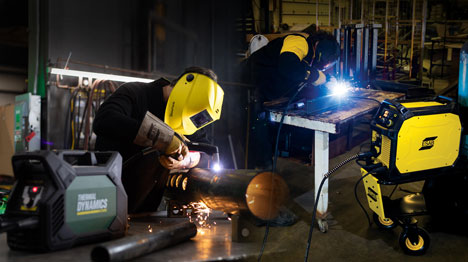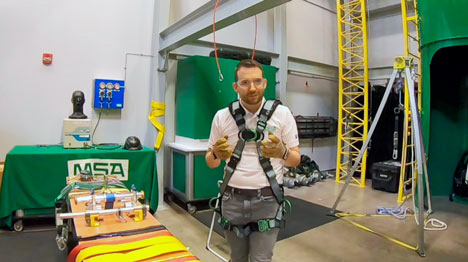Machining Skills Gap: ‘It’s Not Dirty’ Won’t Cut It
Opinion: Let’s problem-solve how we truly can close the skills gap.
Opinion: Let’s problem-solve how we truly can close the skills gap.
Opinion: How can we solve the manufacturing skills gap? We each must become ambassadors for our industry. Our message needs to showcase machining and manufacturing.
“It’s not dirty.”
Have you heard this when someone is trying to describe machining to people who know little or nothing about our trade?
Really? Is this the best message we have? How many of you think that the amount of dirt and grease involved is the primary factor that people consider when choosing a career path?
I make a motion that we think about this message and all the other messages we use in our efforts to recruit potential machinists into the trade.
But before we jump right into the solution, a key part of any good problem-solving effort is to define the problem.
We have all heard about how many jobs are available in manufacturing. We know the need in our companies and in our local manufacturing marketplaces. We need more qualified, hardworking, engaged, capable people with practical mathematic and mechanical aptitudes. And once we find those people, we need to invest a significant amount of time and resources in training them. It would be best if they would stay in the industry for a while so we could realize a return on our investment.

While we are considering this target audience, what is it exactly that we are looking for? Do we want a massive number of people who can join the industry as operators? If we get this pool big enough and deep enough, there is certain to be a percentage who can surface to the top as programmers, managers and, heck, even owners.
Is it time for us, as an industry, to become a little more sophisticated in our recruiting practices? Sure, we want the masses to join the industry. But isn’t what we are really screaming for is more talent, like the top 5 percent of machinists in every shop? Isn’t it easier to find a dozen operator types who could work with your top people to support their efforts than to find one of the top industry talents?
What is the honest impact of this true need on your company? What are the limitations on your business due to the limited number of truly talented people you have? How much more could your company grow if you had more people capable of really understanding how to make complex parts? And what if you had more people who could successfully envision the manufacturing process leveraging all available technologies—machine tools, cutting tools, workholding, software and robotics?
Do we need operators or highly skilled programmers? We need both. But is our messaging getting us either?
What are we currently saying as an industry with our messaging in manufacturing recruiting strategies?
“If you are not interested in college as your primary career path, this is a great alternative for you to consider.”
“These jobs pay well.” We say that and then we publish starting wages of $12 per hour.
And the target of this article: “It’s not dirty.” We all agree that a clean 5S or 6S work environment is a good thing. Occasionally getting dirty is just not something that a machinist really thinks deeply about.
We could add a few more of our standard lines, but let’s stop and look more closely at these three. Do you really think any of these messages have prospective recruits or their parents running to the local trade school to sign up for classes? Is this really the message you share with your nieces and nephews? Your own kids? Would any of these messages get you into the industry? Probably not.
We sell ourselves short as salespeople. If you are a shop owner, could you be successful in working with your bank with the message of “It’s Not Dirty”? Does the bank really care? Do any of the people in the shop? Do you?
Looking for new manufacturing recruitment strategies? Learn how machinist apprenticeship programs can help the skills gap.
I propose that one of the better ways to study and refine our message is by looking at how you got into the industry. Not to scare anyone, but we might have to get personal. Did you grow up knowing what a lathe was and how to use it? Or were you like me and had no idea what an end mill was or that they even existed until you fell into an opportunity to see a milling machine in action?
Once you learned about the industry, what kept you here and motivated you to achieve the heights you attained? Is the message of “It’s Not Dirty” becoming weaker as you backtrack your own path?
These won’t be the only messages we should use, but to get the conversation going, here are four areas we could focus on:
How much does adrenaline play into our trade? How about the machinist making that very expensive part? They have created, read, edited, reread and then double-checked the program on their machine. They have double-checked the workholding. They’ve made sure the coolant is on. They’ve double- and triple-checked the speeds and feeds of their carefully selected and prepared cutting tools.
And then they hit the green button (with their other hand on the red button). Isn’t that the same feeling you got when you stepped up to bat? How about when you try to hit a putt?
What about the adrenaline that a job shop owner feels when he decides to build that much-needed new building? Buy that new turn-mill center? Submit that quote, which if won, will change the future of the company and the lives of everyone who works there?
How can we use the message of challenge, overcoming adversity and, yes, adrenaline in our recruiting efforts?
What do we tell the person who is interested in becoming an engineer or obtaining a college degree? Do we say, “Good luck to you. Wish we could help, but we are looking for people who will retire with our company.”
What if we step back a little and say: If every engineer spent some time in the shop before becoming an engineer, the entire manufacturing ecosystem would become better.
What if we tell that prospective college student something like, “Come on in with your mechanical aptitudes and excellent STEM skill set and learn how to become a machinist. You’ll spend a year at a trade school. You’ll work your way through college with a well-paying job. Maybe most importantly, the practical knowledge you’ll gain in a machine shop will give you an excellent foundation about how almost everything mechanical works. If you end up liking engineering, fair. If you actually learn to love machining, well hallelujah, we’ll be glad to have you.”
We can dance around it all we want, but money is a primary motivator in the career paths that people decide to take. The message here is that those machinists in the top 5 percent really get it and make $100,000 plus.
Is that what the starting wage is for a new recruit? Of course not. The top percenters have gotten there after several years of hard work, training and development.
In our recruiting efforts, should we start by talking about $12 per hour or $100,000? Probably both. We definitely need to put forward an honest but clear path that someone can take to get from that $12 hourly wage to a $100,000 salary.
The way we choose to address this problem will and should be unique. Whatever we do, we must choose to act. This problem is not going to solve itself. The demographics of our society and the fierce competition from other industries for people with the same skill sets will see to that.
We need to reflect on our messaging and turn it back on ourselves. Would it work on you? Would it work on our kids? If it won’t, then we need to really understand this problem and get to work on practical solutions. Don’t think you can do it? I totally disagree.
There is no industry more adept at solving complex problems than the machining industry. If we even began to discuss the complicated environment that we live in every day, this article would grow into a full-length book.
Will we need to think differently than we do when we’re figuring out how to cut cycle time in half? Of course. This is a human issue with human implications and human outcomes.
We need to reflect on our message. We need to personalize the message. Each and every one of us needs to develop our own message and become an ambassador of the trade.
Let’s talk more about how we can become machining ambassadors and help encourage people to join our industry. Follow Broc on Forums right here.
To tell our story well, it has to be our own. It has to be personal. I’ll go first.
I literally fell into the trade at 17 years old, after answering a classified ad seeking a $5 an hour laborer. I have never looked back with anything other than deep appreciation and humble gratitude. In my case, I found my wife, my career and most of my lifelong friends in the industry. I have been able to meet machinists around the world, visiting shops in 43 states and on three continents.
I have been blessed to be able to feed my family and have a life full of great experiences in and out of work.
I do not have a university degree. I did take a few courses at the Bridgerland Technical College. My education has been a combination of seminars, on-the-job training and personal development.
I feel challenged, fulfilled and rewarded to be in the metalworking industry. For me, the reason I am here is simple: I want to help make the world a better place.
I am not inclined to be a doctor and help cure cancer. I am sure as heck not anything close to Mother Teresa. But I like to think that what I do matters: Helping shops machine parts better helps them be stronger. It helps them provide solid employment for a lot of people.
The machining industry is a challenging, honest business that helps so many other industries. I feel proud to be a part of it.




